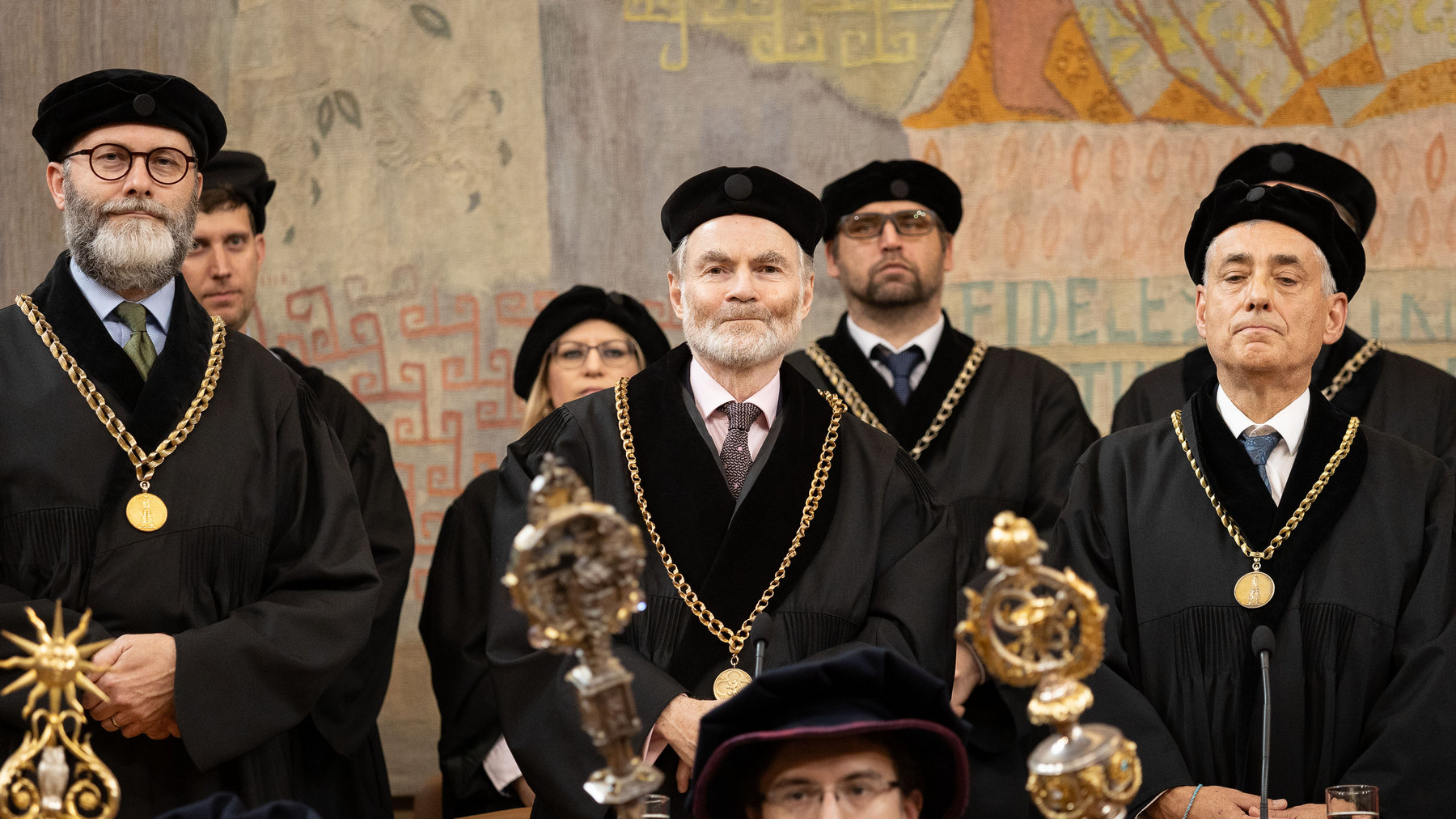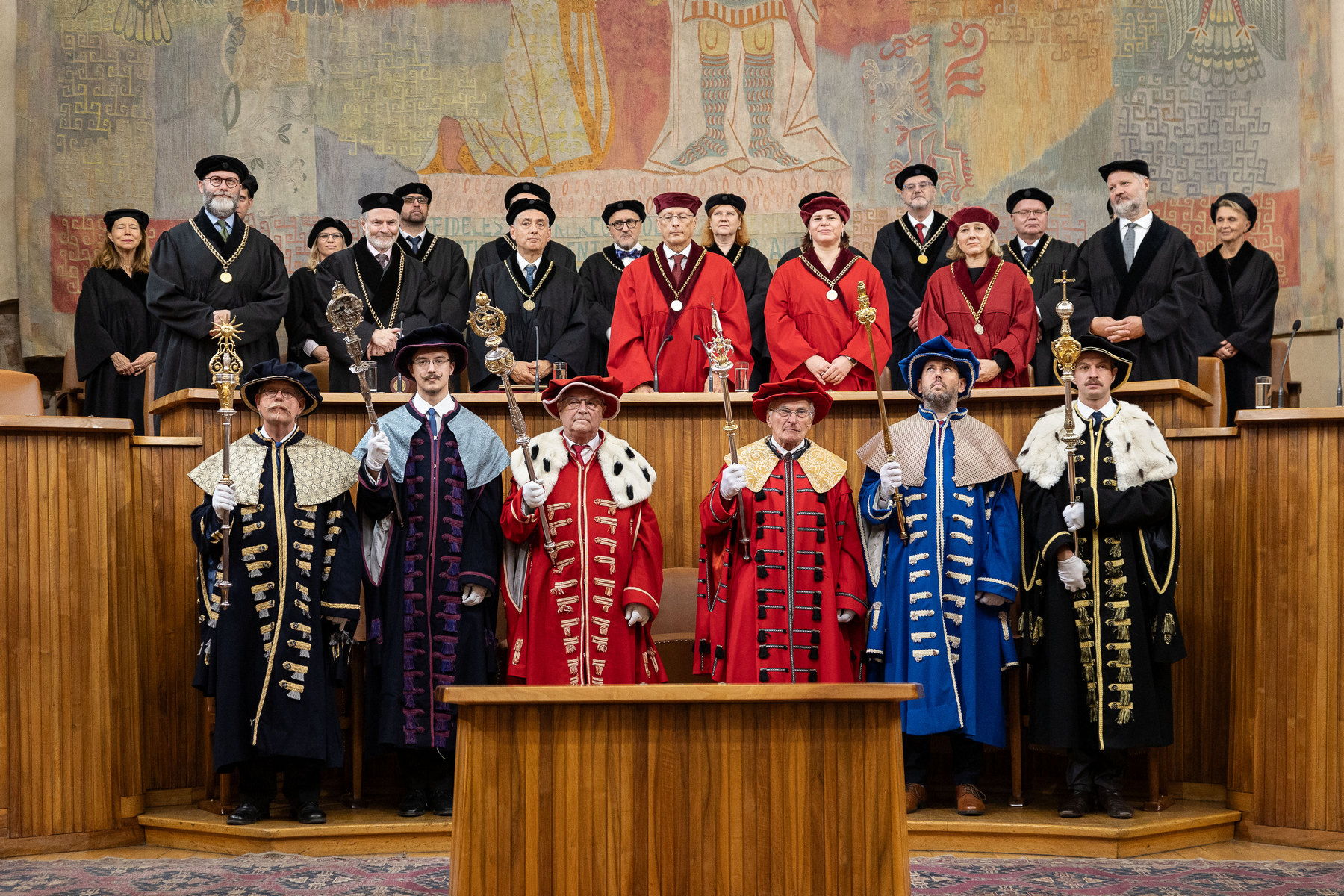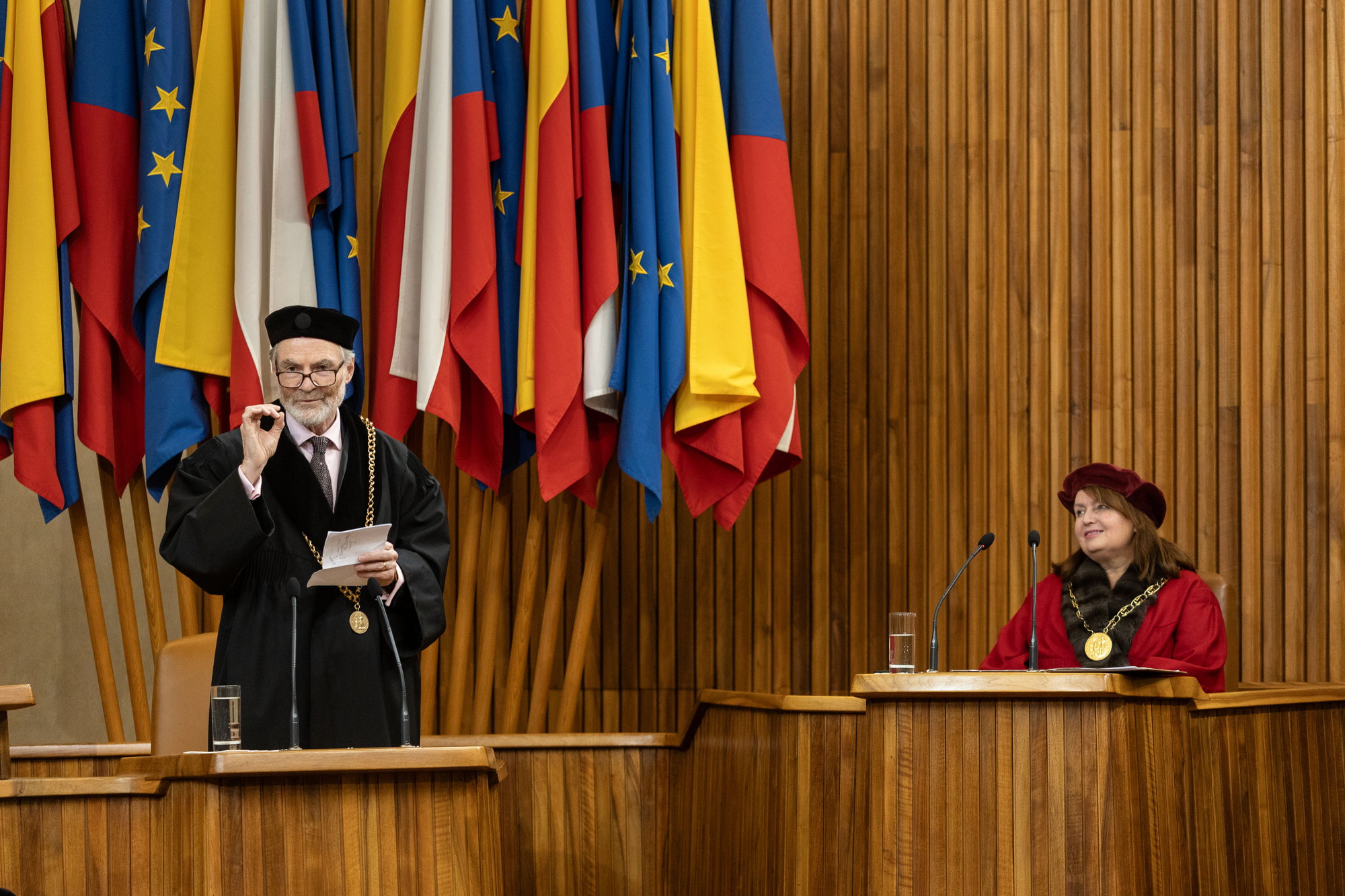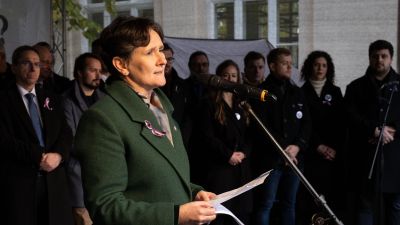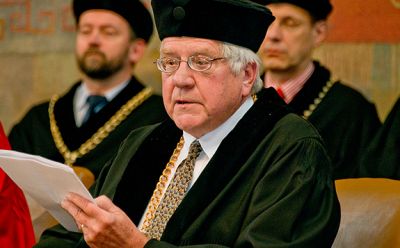Oxford University professor and historian Timothy Garton Ash received an honorary doctorate from Charles University on October 9. In his speech, he emphasized the importance of truth and recalled the long-lasting historical ties between the universities of Oxford and Prague. The ceremony in the Great Hall of the Carolinum was observed by Charles University Rector Milena Králíčková, Dean of the Faculty of Arts Eva Lehečková, Honorabilis Promotor Jan Čermák, and other representatives of Charles University, its faculties, as well as distinguished guests from other universities.
World-renowned historian and political commentator Professor Timothy Garton Ash is known for his extensive writings on the history of Central and Eastern Europe, particularly the former Eastern Bloc countries. He has made a significant contribution to the understanding of the history and political events associated with the fall of communism in the region. His insights into the end of the Cold War, the revolutions of 1989, and subsequent transitions to democracy have significantly contributed to broader understanding of Central European political dynamics over the last decades. Not only a respected academic but also an influential public intellectual, Professor Garton Ash has been a vocal advocate for free speech, democracy, and human rights. His writings often address challenges facing liberal democracy and the importance of defending democratic values against authoritarianism and populism.
“Charles University recognises not only Professor Garton Ash’s forty years of academic and journalistic work, but also his principled advocacy for democratic values – an inspiring voice for all of us during these challenging times for Central and Eastern Europe,” said Dean of the Faculty of Arts Eva Lehečková.
In her laudatio, she also reminded of the fact that the honorary doctorate was first awarded in the late fifteenth century at Oxford University – Professor Garton Ash’s alma mater where he completed his studies in modern history. He then became a fellow at St. Anthony’s College, Oxford, where he headed its European Studies Centre, before being appointed Professor of European Studies at the University of Oxford, a position he held for twenty years. Currently a Professor Emeritus, Professor Garton Ash still is involved for example in the Dahrendorf Programme at the European Studies Centre, which focuses on research on the current position and role of Europe and its relations with other global superpowers.
In his acclaimed book We the People: The Revolution of ’89 Witnessed in Warsaw, Budapest, Berlin and Prague (1990), he depicted the events of 1989 and the fall of Central European communist regimes through first-hand observation. This book, as Eva Lehečková noted, “remains one of the key studies on Czechoslovakia’s transition to liberal democracy.”
Professor Garton Ash has personal ties not only to Central Europe and the Czech Republic, but Charles University itself as well, having lectured here on several occasions, most recently in 2022. He actively promotes academic cooperation between British and Central European institutions and serves as a member of the Academic Board of the Centre for Philosophy, Ethics and Religion, part of the Institute of Philosophy and Religious Studies at Charles University’s Faculty of Arts.
Modern historian by study, Timothy Garton Ash is also active and valued as political writer, journalist, and commentator on history and current events; as recently as a month ago, he warned in his Guardian column that Americans have 400 days to save their democracy. “Hysterical hyperbole?” he asks in the article. “I would love to think so. But during seven weeks in the US this summer, I was shaken every day by the speed and executive brutality of President Trump’s assault on what had seemed settled norms of US democracy and by the desperate weakness of resistance to that assault.”
Upon taking the pledge and receiving his honorary doctorate, Timothy Garton Ash began his speech in Czech, quoting the Czech – and formerly Czechoslovak – presidential motto: “Pravda vítězí.” (Truth prevails). This quote, and especially the concept of truth, was at the centre of his speech, recalled in various connotations. First, he said, “that motto reminds us of the incredibly long and old relationship between our two universities.” Originating with Jan Hus (a Charles University rector, among other), who was in turn responding the work of John Wycliffe, Master of Balliol College in Oxford. “Both of them introduced into medieval discourse the centrality of truth.” The cooperation between the universities in Prague and Oxford has continued ever since, flourishing through the centuries. The first Czechoslovak president Tomáš Garrigue Masaryk, who instated the opening phrase as the presidential motto, received an honorary doctorate from Oxford in 1923.
As a further example of extraordinary mutual support, Professor Garton Ash – frankly admitting he hadn’t known until recently – added that during the Nazi occupation of Czechoslovakia, Charles University degree certificates were offered by Oxford University on behalf of Charles University.
“Today, truth faces a threat which is quite different
from that it faced in the communist period,
but in a way equally dangerous.”
He also recalled Václav Havel, whom he met in person and befriended: “An absolutely formative period of my life, the period in which I became a Central European of choice, was the decade from 1979 when I first came to Prague, until Autumn 1989 – the Velvet Revolution, when I had the great privilege, thanks to Václav Havel, to witness the Velvet Revolution first-hand.”
Václav Havel, Professor Garton Ash says, again endeavoured with his discourse to reinstate the centrality of truth. Using poet James Russell Lowell’s line, ‘Then to side with Truth is noble when we share her wretched crust’, Professor Garton Ash expressed how “it was noble to side with truth at a time when it offered only a wretched crust. But it was also a political strategy, a politics of truth. Because, faced with a totalitarian monopoly of the public sphere, of the information environment, faced with a regime that lived from The Big Lie, to speak the truth was a revolutionary act.”
In yet another parallel, the late Czech president was himself awarded an Oxford University honorary doctorate in 1998. And as Professor Garton Ash mentioned, inviting the audience to visit, within the University Parks in Oxford, there is a Havel’s Place – a memorial place consisting of two chairs and a table, with the famous inscription ‘Truth and love must prevail over lies and hatred’. “By the way, Havel says must, he doesn’t say necessarily will,” Garton Ash pointed out. “That again expresses something very important to me.”
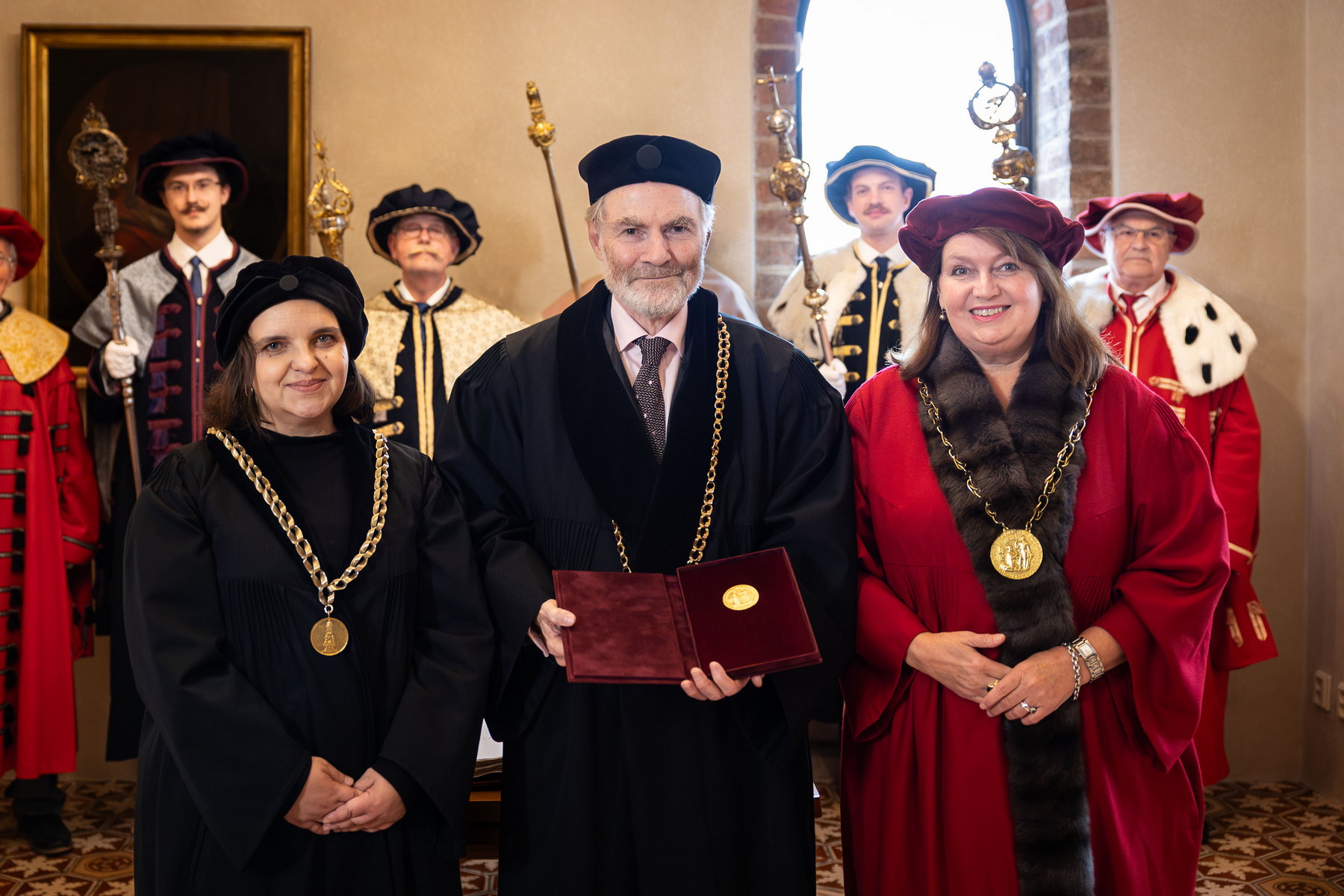 Professor Timothy Garton Ash with Dean of the Faculty of Arts Eva Lehečková and Charles University Rector Milena Králíčková.
Professor Timothy Garton Ash with Dean of the Faculty of Arts Eva Lehečková and Charles University Rector Milena Králíčková.
Lastly, he singled out the role of universities. “Today, truth faces a threat which is quite different from that it faced in the communist period, but in a way equally dangerous. Then, it was a danger of a monopoly, of a single occupation of the public sphere. Now it’s almost the opposite – it’s an infinite profusion of speech, a great fragmentation, and absolutely overwhelming amount of speech, in which you have not one Big Lie, but ten million small lies – or ten million half-truths. There is an old Central European Yiddish saying ‘a half-truth is a whole lie’. This is of course greatly facilitated, magnified and amplified by the algorithms of social media platforms, which optimize not for truth, not for veracity, not for democracy, but for attention – so as to maximize profit. And attention is gained by the sensational, the dramatic, the very often untrue.”
Universities then play an important role as fact-finding and truth-seeking institutions – along with the judiciary and journalism. “In this new, poisoned information environment, we in universities have a vital function in establishing facts, in seeking truth, and then, in trying to disseminate those facts and spread that truth, as much as we can find it, in the wider society. In this sense, I believe that universities have a vital social and civic function, which is as important as it was in the time of Václav Havel, Tomáš Garrigue Masaryk, or indeed, of John Wycliffe and Jan Hus.”
In his latest monograph Homelands: A Personal History of Europe (2023), Professor Garton Ash reflects that while each of us may come from somewhere by birth, one can grow into another environment through choice, passion, and lifelong interest. In this spirit, he considers himself a Central European. And in the very same spirit, on Thursday, Charles University academics officially welcomed Professor Garton Ash into their midst, as one of their own.


